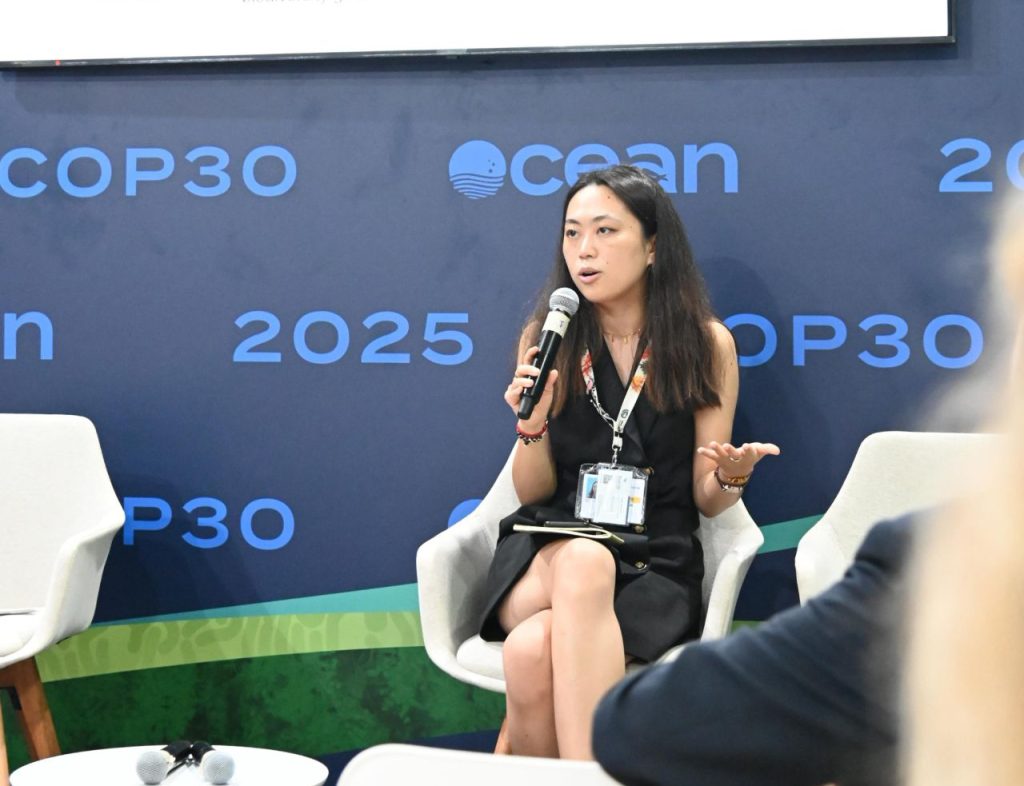
#RESTalksCOP is a COP30 interview series created to bring people closer to the United Nations Framework Convention on Climate Change (UNFCCC) process. Through conversations with negotiators, experts, and civil society, we explore diverse perspectives and behind-the-scenes insights. Recorded on the ground at the 30th Conference of the Parties (COP30), these interviews offer a time-capsule look at the people and stories shaping today’s climate negotiations.
Today we speak with Cathy Li, a longtime voice in climate and nature policy who has been engaged in the UNFCCC process since her teenage years. Now leading climate and energy policy work at BirdLife International, Cathy shares insights from COP30, where she and her colleagues are advising governments, following negotiations, and pushing for deeper synergies between climate, nature, and land.
Cathy Li: I’m Cathy, I work in climate and nature policy. I have been in the UNFCCC process since I was a teenager. It’s been an exciting week so far.
Zvezdana Božović: What are you following at COP30 this year?
Cathy: It’s a bit of everything. My day job is at an NGO called BirdLife International where I lead our climate and energy policy, which includes our UNFCCC work. On the ground, we have thirty colleagues across the partnerships. Some are negotiators on behalf of their government, some are civil society advocates, some are nature-based solutions practitioners on the ground, and some are policy experts, and here we follow negotiations. We advise governments and support governments on negotiations. We are also organizing a range of events, activities, and bilateral conversations and relationship-building. So it’s a whole mix, and in particular, my favorite track of negotiation at this COP is the Subsidiary Body for Scientific and Technological Advice (SBSTA) item 15 on synergies between climate, nature and land, specifically the Rio Conventions.
Zvezdana: It’s kind of a historical moment since it’s been thirty-two years since the last time we were in Brazil and ten years since Paris. A lot of things have changed since then, but what I am interested in is how have you seen the trajectory of nature integration across time, given that you have been in this process for quite a while now? From your perspective here at COP30, how is nature being integrated into the agenda?
Cathy: Yes, I think it’s been an interesting journey if we look back into history from 1992. I was on a panel earlier with Juan Carlos Monterrey, who is Panama’s special representative. He raised a really good point that there were no silos until we created them in 1992. We created the silos at the convention level, in global policy, which then trickled down to government structures, national planning, and then trickled down to implementation.
In the past few years, myself and many incredible colleagues from civil society, from government, have been joining forces to help others recognize these silos and acknowledge that there is so much potential and really a win-win for everyone if we have a more synergistic approach in all these things. I think in particular with this COP… Well, we are in the Amazon as we speak, and I’m not sure if people can hear the rain and thunder in the background, but I think it feels so grounded in reality and with that implementation focus. I think it’s great to see finally this year, we have managed to open the negotiations on the synergies issue. I’m about to head into another one of these negotiations soon.
Zvezdana: You sound optimistic about the outcomes of this year.
Cathy: I think there is overwhelming support from governments that are developed, like Australia, but also ones who are made the most vulnerable, like the small island states, like Colombia, like the government of Brazil’s leadership. So I think it’s really great to see the progress and of course, there are a lot of discussions around forests and oceans, and a bunch of other issues at this COP. Of course, all negotiations have their challenging side, but my hope is that we managed to make concrete progress at this COP to strengthen the collaboration and coordination across these three conventions, as well as at national and local levels. And I feel positive about that, so hopefully we will see history being made.
Zvezdana: If you could pinpoint any obstacles in the way of integrating these synergies in the upcoming period, what would they be?
Cathy: That’s really interesting. I think one is that for thirty-two years, this is the structure we’re used to, this is how our brain has been functioning. We say this convention has this mandate, that convention has that mandate, this is how the world works. And there are, of course, the power dynamics within the government, within UN, within civil society, on who gets to make decisions about what. I think there are challenges about human nature of us all, wanting to protect our own favorite area. But I think also in negotiations, there is one particular country grouping that has been opposing this, despite the fact that within many parts of their government there is so much effort and them being really keen on taking international leadership on this issue. I think that also shows how sometimes things are disconnected and disjointed and of course, that group has a reputation of slowing down multiple negotiation tracks every year.
But I am really positive and hopeful because of this overwhelming support. I think this is probably one of the nicest negotiation tracks I’ve ever closely worked on because there are no huge debates. There’s only overwhelming support from all governments. We recognize the issue, we know where we need to get to and we are calling for spaces to plan out what are the best ways to build more synergies and address the silos. I think this is extremely positive, and hopefully we get some good outcomes, despite some minor pushbacks.
Zvezdana: This COP has been dubbed as the “COP of Truth”. In this sense, how do you see the future of the COPs from this point onwards? There is talk of reform and how do we determine who gets to participate? Is the COP as a structure robust and adequate enough to address the challenges of tomorrow?
Cathy: I think it is interesting that this is UN80, we are having this big anniversary, but also with quite unprecedented challenges to the whole multilateral system, seeing the divide and wars and conflicts across the world this year. I think it’s a moment that challenges the multilateral system, but it is also a moment that makes us reflect if this system built eighty years ago, when the world was in a very different place and coming out of a very different situation, is still fit for purpose and fit for today and tomorrow’s world? I think it’s really interesting to see how many governments, the UN and many stakeholders are utilizing this opportunity, also given the financial challenges. They had to rethink how we can be more efficient and how we structure to better deliver the goals and visions in a way that is fit for today’s international context and fit for tomorrow’s world that we want to build. Of course, I think we’ve all heard that there are certain challenges experienced by UN agencies, by governments, but I also think that in the future, it would be interesting to see in the coming years how this climate convention, but also other UN and multilateral processes reflect on if having more events is better, if the number of attendees means more equity. I think as an organization, it should always be evolving and I think this is sort of a fortunate and unfortunate situation where we sort of have to evolve quickly and think about things. Obviously, during this process, there will be things that you and I personally think would be super valuable, or someone else thinks are extremely valuable that will take some hits, but I hope that overall, when we look back in five or ten years’ time, we think that although it was an uncomfortable moment to many people and processes, it does modernize the process a little bit as well.
Zvezdana: Thank you! What are you working on now, or would you like to spotlight any project dear to you?
Cathy: Besides the climate negotiations that I’ve already touched upon and working in my day job with our national partners and one hundred and nineteen countries. Although I am not extremely knowledgeable on the ground, my knowledge is mostly in those negotiation rooms. I hope that I’ll be able to do more projects and work that are more linked to the work on the ground and seeing those realities and seeing how we can better advocate and design international policy that really benefits the local communities and the stakeholders.
On the energy policy side, I think it is really interesting that we will be back in Brazil in March 2026 for the UN Convention on Migratory Species. It’s not the most known UN convention, but it does incredible work and I run our energy task force chaired by the government of Brazil. We’ll be back in Campo Grande, which is near the Pantanal, which is a beautiful wetland. I think the government of Brazil deserves a shout-out and my incredible colleagues and stakeholders deserve a shout-out for fostering synergies, not only within the Rio Conventions, but also across the space. I think it’s really impressive to see how Brazil is taking leadership and challenging some of the norms in the multilateral process and encourage and nudge us to redesign and rethink how we best serve the people who are at the heart of this process.
Zvezdana: Great! If people want to know more about your work, where can they find you?
Cathy: They can find me on LinkedIn with my full name “Cathy Yitong Li” or they might catch me in person at some of the events.
Interview conducted on 17 November 2025
